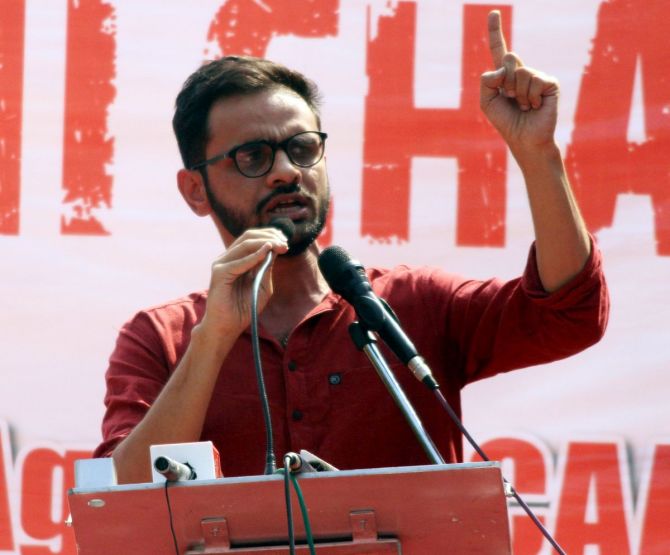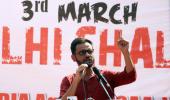The Delhi high court on Tuesday refused to grant bail to former Jawaharlal Nehru University student Umar Khalid, in custody for over two years, in a Unlawful Activities (Prevention) Act case related to the alleged conspiracy behind the riots in Delhi in February 2020, saying he was in constant touch with other co-accused and allegations against him are prima facie true.

The court also said the acts of the accused prima facie qualified as “terrorist act” under the anti-terror law UAPA.
A bench headed by Justice Siddharth Mridul said the anti-CAA protests “metamorphosed into violent riots”, which "prima facie seemed to be orchestrated at the conspiratorial meetings”, and the statements of the witnesses indicate Khalid's “active involvement” in the protests.
“The appellant (Khalid) was in constant touch with other co-accused persons, including Sharjeel Imam, who arguably is at the head of the conspiracy; at this stage (of bail), it is difficult to form an opinion that there are not reasonable grounds for believing that the accusation against the petitioner is prima facie not proved,” observed the bench, also comprising Justice Rajnish Bhatnagar.
“On in-depth and considered perusal of the chargesheet, the accompanying documents ….this court expresses the inescapable conclusion that allegations against the appellant are 'prima facie true' and hence, the embargo (on bail) created by Section 43D(5) of UAPA applies squarely.. Thus, the appellant's application seeking regular bail is rejected,” the court ruled.
Khalid, Sharjeel Imam, and several others have been booked under the anti-terror law Unlawful Activities (Prevention) Act (UAPA) and provisions of the Indian Penal Code for allegedly being the "masterminds" of the February 2020 riots, which left 53 people dead and over 700 injured.
The violence had erupted during the protests against Citizenship (Amendment) Act and National Register of Citizens.
In its 52-page order, the court observed that the “planned protests” were not the kind that are “normal in political culture or democracy (but were) far more destructive and injurious geared towards extremely grave consequences” and the acts of the accused prima facie qualified as “terrorist act” under UAPA.
Taking the charge sheet and other material on face value, the court noted there was intentional blocking of roads to cause disruption in north-east Delhi, and the weapons used, the manner of attack and the resultant deaths and destruction indicate it was pre-planned.
It asserted that acts which threaten the country's unity, cause communal friction and create terror in any section of the people by disturbing the social-fabric is a “terrorist act” and the issue of granting bail in the present case has to be considered in the "larger context of the societal concerns involved in releasing an accused in juxtaposition with individual liberty”.
The court said the statements of the protected witnesses indicate the presence and active involvement of the appellant in the protests against the Citizenship (Amendment) Act and National Register of Citizens.
"Admittedly these protests metamorphosed into violent riots in February 2020, which began by firstly choking public roads, then violently and designedly attacking policemen and random members of the public, whereat firearms, acid bottles, stones etc. were used, resulting in the admitted and sad loss of 53 precious lives and the destruction of property worth several crores," it said.
These protests and riots prima facie were orchestrated at the conspiratorial meetings held from December 2019 till February 2020, the court said.
“As per the pre-meditated plan there was an intentional blocking of roads to cause inconvenience and disruption of the essential services to the life of community residing in North-East Delhi, creating thereby panic and an alarming sense of insecurity. The attack on police personnel by women protesters in front only followed by other ordinary people and engulfing the area into a riot is the epitome of such premediated plan and as such the same would prima facie be covered by the definition of 'terrorist act',” it added.
The court said the weapons used, the manner of attack and the resultant deaths and destruction caused indicate the mayhem was pre-planned.
"Acts which threaten the unity and integrity of India and cause friction in communal harmony and create terror in any section of the people, by disturbing the social-fabric is also a priori a terrorist act,” the court observed.
Khalid, arrested by Delhi Police in September 2020, was represented by senior advocate Trideep Pais, who sought bail on the ground that he neither had any criminal role in the violence nor any “conspiratorial connect” with any other accused in the case.
The Delhi Police, represented by special public prosecutor Amit Prasad, opposed the bail plea by Khalid, saying the speech delivered by him was a “very calculated” and brought up issues like Babri Masjid, triple talaq, Kashmir, the alleged suppression of Muslims and the CAA and NRC.
The high court had issued notice to the Delhi Police on Khalid's bail plea in April.
The bench had on September 9 reserved its order on the plea of Khalid who had challenged a trial court's March 24 order dismissing his bail application in the case.
Besides Umar Khalid, activist Khalid Saifi, JNU students Natasha Narwal and Devangana Kalita, Jamia Coordination Committee members Safoora Zargar, former AAP councillor Tahir Hussain and several others have also been booked under the stringent anti-terror law in the case.










